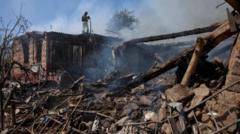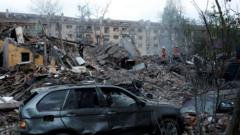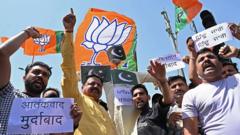As diplomatic initiatives to resolve the ongoing war in Ukraine intensify, high-level discussions are taking place between officials from the UK, Germany, France, Ukraine, and the United States. With Donald Trump’s special envoy, Steve Witkoff, making his fourth visit to Moscow to meet President Putin, hopes for a breakthrough are rising. However, the likelihood of a successful conclusion to these talks remains uncertain.
Diplomatic Efforts Accelerate Amid Uncertainty Over Ukraine War Resolution

Diplomatic Efforts Accelerate Amid Uncertainty Over Ukraine War Resolution
Intensive international negotiations are underway to end the Ukraine conflict, but clarity on a successful resolution remains elusive.
The American strategy for ending the war initially involved a prompt, unconditional 30-day ceasefire, followed by extensive discussions to establish a lasting peace settlement. Ukraine had previously agreed to this plan, conceding its demand for security guarantees in light of U.S. encouragement.
In contrast, Russia remained inflexible, insisting on stringent preconditions before ceasing hostilities. President Putin emphasized the necessity of addressing the "root causes" of the conflict, particularly concerns regarding NATO expansion and Ukraine's sovereignty. As the U.S. responds to these demands, they are piecing together a ceasefire proposal.
Recent leaks hint at a framework where Russia would stop its military advances while renouncing aspirations over the remaining contested territories—Luhansk, Donetsk, Zaporizhzhia, and Kherson. In return, the U.S. might accept Russian control over these regions and recognize Crimea as part of Russia, while also ensuring Ukraine does not pursue NATO membership. As part of this arrangement, control over the Zaporizhzhia nuclear facility may be transferred to the U.S., allowing for a shared management of its electricity output.
Despite this proposal appearing far-fetched—given President Zelensky's firm stance against conceding Crimea—the plan has not been entirely dismissed by Western diplomats, who emphasize a need for trust among the negotiating parties. Observers note significant gaps in the proposal, including the absence of terms banning Western military assistance to Ukraine and Russia's demands for Ukraine’s demilitarization, which remains a crucial point of contention.
Notably, while a cessation of hostilities is sought, Ukraine is still advocating for an immediate conditional ceasefire, a position at odds with the U.S. desire for a swift resolution and Russia's insistence on a detailed lengthy peace agreement.
With various factions holding starkly different expectations, the prospects for agreement seem dim. The ongoing negotiations exemplify the adage that "nothing is agreed until everything is agreed," and for now, the parties appear a long way from achieving such consensus.
In contrast, Russia remained inflexible, insisting on stringent preconditions before ceasing hostilities. President Putin emphasized the necessity of addressing the "root causes" of the conflict, particularly concerns regarding NATO expansion and Ukraine's sovereignty. As the U.S. responds to these demands, they are piecing together a ceasefire proposal.
Recent leaks hint at a framework where Russia would stop its military advances while renouncing aspirations over the remaining contested territories—Luhansk, Donetsk, Zaporizhzhia, and Kherson. In return, the U.S. might accept Russian control over these regions and recognize Crimea as part of Russia, while also ensuring Ukraine does not pursue NATO membership. As part of this arrangement, control over the Zaporizhzhia nuclear facility may be transferred to the U.S., allowing for a shared management of its electricity output.
Despite this proposal appearing far-fetched—given President Zelensky's firm stance against conceding Crimea—the plan has not been entirely dismissed by Western diplomats, who emphasize a need for trust among the negotiating parties. Observers note significant gaps in the proposal, including the absence of terms banning Western military assistance to Ukraine and Russia's demands for Ukraine’s demilitarization, which remains a crucial point of contention.
Notably, while a cessation of hostilities is sought, Ukraine is still advocating for an immediate conditional ceasefire, a position at odds with the U.S. desire for a swift resolution and Russia's insistence on a detailed lengthy peace agreement.
With various factions holding starkly different expectations, the prospects for agreement seem dim. The ongoing negotiations exemplify the adage that "nothing is agreed until everything is agreed," and for now, the parties appear a long way from achieving such consensus.




















